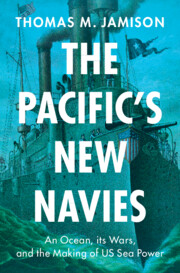Book contents
- The Pacific’s New Navies
- Military, War, and society In Modern American History
- The Pacific’s New Navies
- Copyright page
- Dedication
- Contents
- Figures and Table
- Acknowledgments
- Introduction
- 1 The Confederate “Navy to Construct”
- 2 The Pacific’s Civil War Inheritance
- 3 Pacific Naval Races and the Old Steam Navy
- 4 Pacific Wars and Their Lessons
- 5 The Californian Case for a New Navy
- 6 The US New Navy Wins a Race – Finally
- 7 The Sino-Japanese War and New “Yankees” in the Pacific
- Conclusion
- Notes
- Bibliography
- Index
6 - The US New Navy Wins a Race – Finally
Published online by Cambridge University Press: 05 December 2024
- The Pacific’s New Navies
- Military, War, and society In Modern American History
- The Pacific’s New Navies
- Copyright page
- Dedication
- Contents
- Figures and Table
- Acknowledgments
- Introduction
- 1 The Confederate “Navy to Construct”
- 2 The Pacific’s Civil War Inheritance
- 3 Pacific Naval Races and the Old Steam Navy
- 4 Pacific Wars and Their Lessons
- 5 The Californian Case for a New Navy
- 6 The US New Navy Wins a Race – Finally
- 7 The Sino-Japanese War and New “Yankees” in the Pacific
- Conclusion
- Notes
- Bibliography
- Index
Summary
The Pacific not only inspired early investments in the New Navy but the region also offered a series of crises in which the United States could deploy naval assets. As of 1890, the New Navy could muster only five modern warships into its model “Squadron of Evolution.” As a collective, it was a force that mattered little to the North Atlantic balance of power. In the Pacific, by contrast, New Navy ships were sufficient to force Chile – a longtime antagonist – into diplomatic settlements during the Chase of the Itata (1891) and the Baltimore Incident (1891–1892). These successful acts of “cruiser diplomacy” delivered political results. Naval proponents cited operations in the Pacific as evidence of the New Navy’s efficacy and necessity. By 1893, as its sailors and marines intervened in the Hawaiian Coup, the New Navy already had a record of coercion in the Pacific. Such results undergirded celebrations and naval reviews from Astoria, Oregon to New York City, as officials displayed the New Navy and its achievements to the public and the world.
Information
- Type
- Chapter
- Information
- The Pacific's New NaviesAn Ocean, its Wars, and the Making of US Sea Power, pp. 127 - 151Publisher: Cambridge University PressPrint publication year: 2024
